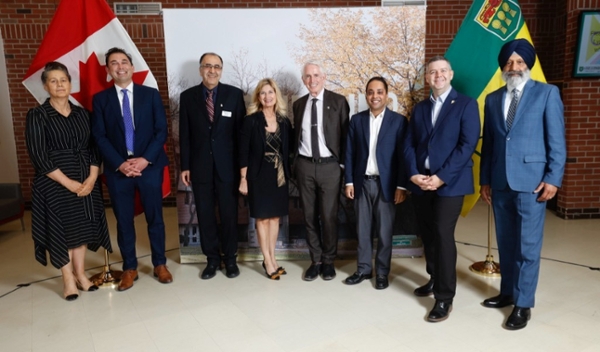
Alum leads major gift to college
Amit Gupta returned to the College of Engineering, where he hung out as a kid, to announce a significant gift that will establish the Siemens EDA (Electronic Design Automation) Chair.
By Donella HoffmanSince Amit Gupta earned his electrical engineering and computer science degrees at the University of Saskatchewan (USask) in 1999, he has founded and sold two successful technology startups and is now a leader at Siemens EDA, Saskatchewan’s largest technology company.
On June 27, he returned to the College of Engineering to announce a significant gift from Siemens to establish and fully fund the Siemens EDA Chair in the college, with the goal of advancing research and giving USask undergraduate and graduate students the skills they need for success in the rapidly growing field of electronic design automation (EDA).
“Siemens sees Saskatoon as a centre of excellence because it’s a great place to recruit, retain and grow talent,” says Gupta, vice-president and general manager of Custom IC Verification at Siemens EDA. “We’re making this investment in the University of Saskatchewan to further develop the ecosystem for electronic design automation right here in Saskatoon.
“It’s not just great for the university and great for Siemens; I think it’s very impactful for the whole province, particularly the tech sector,” Gupta added.
Electronic design automation is a field that provides software used to make electronic chips. Chips are used to power most modern devices, including smartphones, tablets, PCs and automobiles. Siemens expanded its global footprint to Saskatoon after it acquired Gupta’s second start-up, Solido Design Automation, in 2017.

“Amit is an example of how a USask Engineering education provides a foundation, both in technical expertise and leadership skills, that helps students launch successful careers,” said Carey Simonson, interim dean of USask Engineering.
“The acquisition of his company led to a large multinational corporation coming to Saskatoon and expanding, and now it’s giving back to help future students.”
The recent gift announcement saw Gupta return to the college he knows well. His father, Dr. Madan Gupta (PhD), was a longtime faculty member in the Department of Mechanical Engineering. The elder Gupta was honoured as a Distinguished Professor in 2010 and before his passing in 2021 he was on the Stanford University list of scientists who were among the top two percent in their fields.
Growing up, Amit often came to the college with his dad, and while he recalls trips to the vending machines for snacks, he also had a front-row seat for his dad’s job.
“I would watch my father do research and meet with his graduate and undergraduate students, so I was exposed to engineering at a very, very early age.”
As a student at Marion Graham Collegiate, Gupta says he was especially interested in math and physics, so electrical engineering and computer science were natural degrees for him to pursue.
He was also drawn to entrepreneurship; by late elementary school he was reading biographies of technology entrepreneurs like Steve Jobs and Bill Gates.
“I always thought that it was really fascinating how these entrepreneurs would build products and businesses and products from scratch that would have a big impact on society.
“Going into university, I was pretty interested in doing something within the area of technology entrepreneurship after I graduated.”
That plan came to fruition during Gupta’s last year in the college. Before graduating, engineering students must complete the Capstone Design class. In teams, usually of four students, they work over two semesters to solve a real-world engineering problem specific to their discipline. Gupta says he wanted to work on something that could evolve into a start-up after he graduated.
His group’s project, which won the college’s 1999 capstone design competition, focused on the developing software to automate the design of analog chips. The project was the precursor to Analog Design Automation, founded by Gupta in 1999 and purchased in 2004 by Synopsys, a tech giant headquartered in Silicon Valley.
Next, in 2005, Gupta founded Solido Design Automation. Its proprietary EDA software used artificial intelligence (AI) to help major technology companies design high-performance, high-quality electronic chips. Siemens bought Solido in 2017 and has grown its Saskatoon office since.
“We pioneered applying AI to electronic chip design,” said Gupta. “As a result, our software is now being used to make most of the world’s chips better and faster.”
The holder of the Siemens EDA Chair, based in the Department of Electrical and Computer Engineering, will develop and teach undergraduate and graduate courses in EDA. The chair will also perform research and supervise and mentor undergraduate research interns, master’s and PhD students, as well as visiting students and post-doctoral fellows.
When Siemens acquired Saskatoon-based Solido in 2017, there were about 50 people working there. Today there are hundreds of local people working for the company in the areas of research, development and customer applications.
“Siemens has invested very heavily in growing our Saskatoon presence. And our team are mostly engineering or computer science graduates,” said Gupta.
“Creating this chair provides students exposure and training specifically in this field, and then they have the opportunity to have fulfilling careers right here in Saskatoon with Siemens EDA.”

